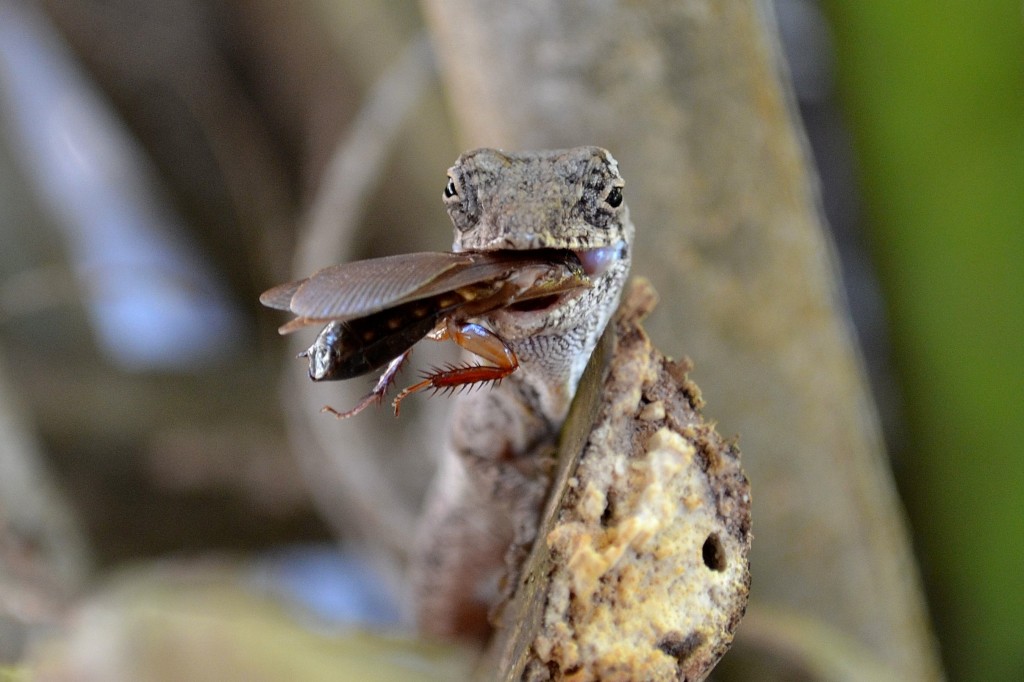| Online: | |
| Visits: | |
| Stories: |
Mom’s Diet Is Important for Her Babies–Even in Anoles!
What moms eat and how much they eat can affect their reproduction, as well as many characteristics of their offspring – this has been shown in many different animals. But are these effects found in anoles as well? Two recently published papers from my lab address this topic in Anolis sagrei. In the first paper (coauthored with Matt Lovern), we housed reproductive females under two diet treatments (low vs. high amounts of food) for about four months in the lab. After quantifying reproductive variables (e.g., egg production, egg size, yolk steroid hormones) and offspring phenotypes, we showed that diet treatment had no effect on how many eggs a female produced and on allocation of steroid hormones to yolk, but females in the high-food treatment consistently produced larger eggs (resulting in larger offspring) than those in the low-food treatment. Also, regardless of maternal feeding treatment, egg size and the concentration of yolk testosterone increased over successive eggs that females produced.
We then incubated the eggs and raised the offspring under controlled conditions in the lab. Offspring produced by mothers in the high-food treatment had increased growth rates and survival; these patterns were driven by offspring size (larger size offspring in the high-food maternal treatment). We then performed a complementary study where we reduced maternal yolk investment by experimentally extracting yolk from eggs in order to determine if the effects of maternal diet were mediated by the amount of yolk invested into eggs. The effect of experimental yolk reduction on egg/offspring size, growth and survival mirrored the effects of maternal diet. These findings suggest that the maternal effects of diet on offspring growth and survival are likely mediated by how much yolk females allocate to eggs. This study provides evidence for a functional mechanism of diet-mediated maternal effects and demonstrates that there are fitness consequences of maternal diet.
Whether these effects of maternal diet are adaptive was the topic of the second study (coauthored by three undergraduate students in my lab). This “follow-up” study (conducted a few years later) was also a controlled lab-based study, where we housed mothers under similar “high” versus “low” diet treatments as described above (but the treatments were not entirely the same for logistical reasons). The resultant offspring were then raised reciprocally under the same two diet treatments that their mothers experienced. This experimental design (two levels of maternal diet and two levels of offspring diet) enabled us to test whether low food availability to mothers “prepares” offspring for low-food environments, and likewise, whether high-food maternal environments “prepare” offspring for environments with plenty of food.
Surprisingly, the effect of diet treatment on maternal reproduction was the opposite of that found in the first study. This time the number of eggs produced by females in the low-food treatment was half that produced by females in the high-food treatment; egg size was not affected at all by diet treatment. These contrasting results could be explained by the slightly different feeding regimes – in the first study, all lizards were given the same amount at each feeding, but the feeding frequency per week differed between treatments, whereas in the second study the feeding frequency was the same between treatments and the quantity of food provided differed between treatments.
Despite this, the primary finding of the study was that offspring survival was relatively high when there was plenty of food available to them (not surprising). However, offspring also survived comparatively well under poor food conditions, but only when their mothers also had little amounts of food during reproduction. These findings suggest that poor maternal environments might ‘prepare’ offspring for environments with little food resources.
Source: http://www.anoleannals.org/2015/05/16/moms-diet-is-important-for-her-babies-even-in-anoles/





